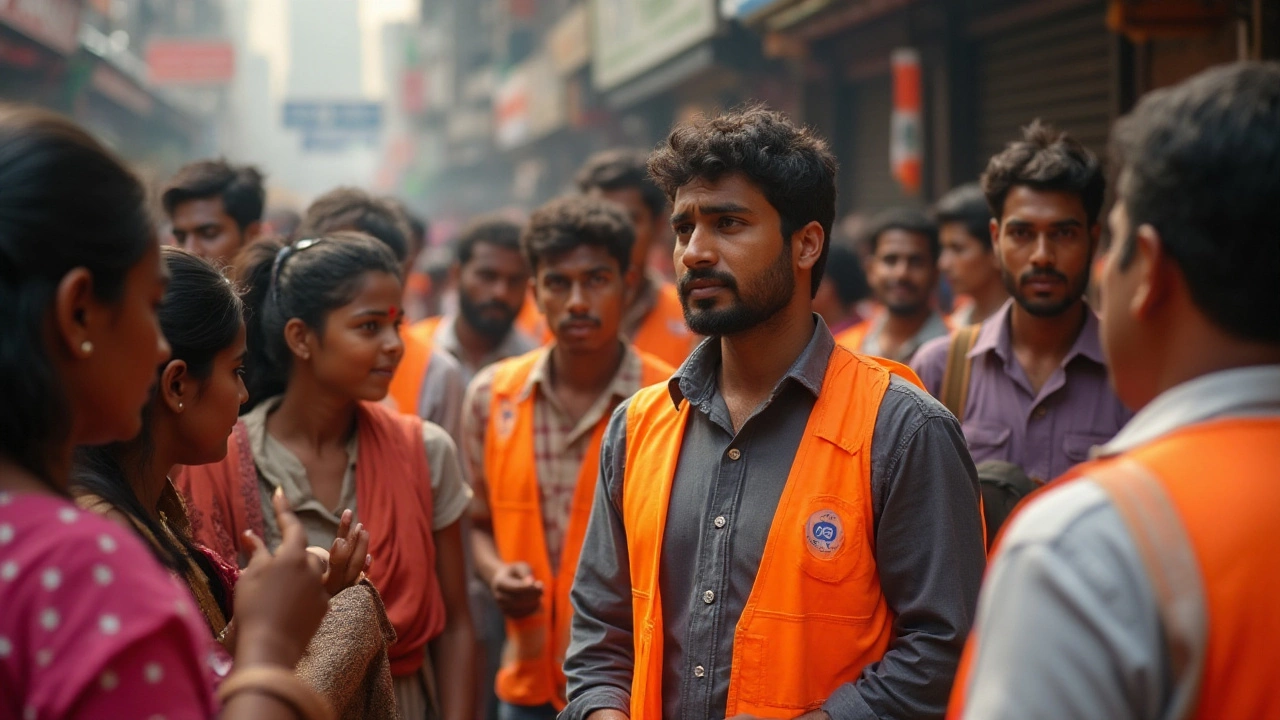Volunteering is a generous act, often filled with promises of new experiences and personal growth. However, like any endeavor, it comes with its own set of challenges and potential dangers that every volunteer should be aware of. From physical safety to emotional well-being, the spectrum of risks can be broad and complex. Understanding these perils and preparing adequately can help mitigate them, ensuring that volunteers can fully enjoy their altruistic adventures.
What's important is the ability to recognize these risks before they turn into significant concerns. For instance, a volunteer engaging in construction work might face different challenges compared to one volunteering in a healthcare setting. Furthermore, the emotional toll of working in crisis areas can be heavy, requiring resilience and support systems.
Legal issues are another facet that can surprise even the most well-meaning volunteers. From understanding liability waivers to ensuring compliance with local laws, knowing your rights and responsibilities is crucial. Volunteers often step into environments vastly different from their own, presenting cultural and environmental hurdles that need thoughtful navigation.
By being aware of these aspects, volunteers can take proactive steps to reduce risks. With the right preparation and mindset, volunteering can truly be a rewarding experience, leaving a positive impact on both the volunteer and the communities they serve.
- Recognizing Physical Risks in Volunteering
- Emotional and Psychological Challenges
- Legal and Ethical Concerns
- Cultural and Environmental Factors
- Steps to Minimize Volunteering Risks
Recognizing Physical Risks in Volunteering
Volunteering, by its very nature, often involves stepping into unfamiliar territories and situations. As noble as the mission might be, volunteers must acknowledge the potential volunteering risks concerning their physical well-being. These risks can vary widely, depending on the type of volunteer work and the environment. For instance, those involved in construction projects in developing areas may face hazards like unstable structures, heavy lifting, and exposure to harsh weather conditions. Despite the prominence of physical activity in many voluntary roles, volunteer safety can sometimes be overlooked, though it should remain a top priority.
Examples abound of how physical risks manifest. Consider the volunteer firefighters, who bravely combat blazes but are at risk of smoke inhalation, burns, and physical exhaustion. Similarly, healthcare volunteers in overseas clinics may face infectious diseases, often in settings where medical resources are minimal. Natural disasters also present unique challenges; volunteers in these scenarios may need to cope with flooding or earthquake aftershocks. In such circumstances, safety gear like masks, gloves, and helmets are not just recommended—they are essential.
Delving deeper, nutritional challenges may arise, especially when volunteering in areas with limited access to food and clean water. Volunteers may find themselves adapting to diets drastically different from their norm, which can lead to an energy deficit or illness if not properly managed. Additionally, inadequate hydration is a risk in hot climates and during physically demanding activities. The key is to maintain a balanced intake of food and water, even when options are sparse.
"Anyone considering volunteering should prioritize their health and safety right alongside their passion to help," notes Sarah Johnston, an experienced humanitarian worker.
Healthcare precautions should not be underestimated. It's vital for volunteers to ensure they have the necessary vaccinations before departing to at-risk regions. Portable first-aid kits are indispensable, equipped with bandages, antiseptics, and any personal medication that might be required. Equally important is understanding the local emergency services to know where to seek aid should an incident occur. Volunteer organizations often provide guidance, but personal responsibility is key.
Moreover, digital technology can play a critical role in mitigating risks. Mobile apps designed to provide real-time weather updates, geographical data, and emergency contacts are invaluable tools for volunteers. Organizations encouraging involvement in volunteer opportunities should stress the importance of these resources and offer technology briefings as part of their pre-departure training.
Lastly, pairing up with a fellow volunteer or assigning a buddy system not only enhances safety but boosts morale. Knowing there's someone nearby to assist in case of an emergency can make a significant difference. The shared responsibility also helps in being accountable, ensuring each other's well-being is prioritized. Recognizing and planning for physical risks is not about deterring volunteerism; rather, it's about enhancing the experience so that volunteers return home unharmed and enriched by their selfless service.
Emotional and Psychological Challenges
Volunteering, often viewed through a lens of altruism and optimism, carries with it a bouquet of emotional and psychological challenges that aren't immediately apparent to first-time volunteers. It’s one thing to imagine oneself lending a hand in a disaster zone or helping underprivileged communities, but the reality of confronting these environments can take a toll on mental health and emotional well-being. The cognitive dissonance between expectations and reality can lead to stress, anxiety, and even depression for some.
Psychologists note that the very act of facing someone else’s trauma can trigger a phenomenon known as secondary trauma. This occurs when a person is exposed, even second-hand, to another's suffering, potentially leading to symptoms akin to PTSD. Volunteers often find themselves in emotionally charged situations where they may feel powerless, unable to ease a person’s suffering, despite their efforts. Moreover, adjusting to the cultural nuances or the stark differences encountered in new environments can exacerbate feelings of isolation or stress. Many volunteers report an initial euphoria upon beginning their work, which can quickly be overshadowed by the overwhelming nature of the tasks at hand.
Volunteer safety is not just about physical well-being; emotional resilience plays a critical role too. It’s essential that volunteers prepare mentally and seek proper support mechanisms. Many organizations now offer pre-deployment training to help volunteers understand what they should expect and how to manage their emotional responses. It's also beneficial to establish a network of fellow volunteers for peer support, creating a safe space to share experiences and feelings without judgment. Peer support can often be more effective than traditional counseling, given the shared understanding and experiences of those involved.
“There is nothing permanent except change,” said Heraclitus, and no statement holds truer for those volunteering in dynamic or uncertain conditions, adapting to fluctuating needs, climates, and emotional states.
For all potential volunteers, being aware of the psychological risks and actively engaging in practices to mitigate these issues is vital. Techniques such as mindfulness, reflection periods, and guided debriefings can significantly contribute to maintaining mental health during the volunteer experience. Some organizations also recommend maintaining a daily journal to process emotions, and reflect on personal growth—turning this challenging experience into a profoundly enriching one.

Legal and Ethical Concerns
When stepping into the world of volunteering, individuals often concentrate on the nobility of their actions rather than the legalities involved. Yet, understanding and addressing legal and ethical concerns is pivotal for maintaining the integrity and safety of the volunteer experience. Many volunteers may not realize the implications of legal responsibilities, often involving issues such as liability, confidentiality, and compliance with local regulations. These factors can vary greatly depending on the country or even the specific organization with which one is involved. For instance, in some regions, volunteers might be required to undergo extensive background checks, especially when working with vulnerable groups like children or the elderly.
One of the critical components of legal responsibilities is the need for a comprehensive liability waiver, which protects both the volunteer and the host organization. This waiver typically outlines the potential risks involved and the extent to which the organization is liable for accidents or incidents. According to a study by the Center for Volunteering Research, over 70% of volunteer programs now incorporate some form of legal documentation to safeguard both parties involved.
"Volunteers are the backbone of many initiatives, yet without proper legal frameworks, both volunteers and organizations can find themselves in precarious situations," says Dr. Luminita Duggal, head of Volunteer Legal Support Institute.Navigation of these legal waters not only safeguards the volunteer but also enhances trust and cooperation between volunteers and their organizations.
In the realm of ethical concerns, preserving the dignity and respect of the communities volunteers engage with is paramount. It's essential to cultivate a mindset of service without imposing one’s own values or cultural norms. Ethical volunteering involves understanding the cultural nuances and respecting the community's way of life. For instance, in projects where volunteers offer medical aid, it's vital they have sufficient training and work under the guidance of qualified professionals to prevent harm or perform unintentionally illegitimate practices. Training sessions and orientations are often implemented by organizations to ensure volunteers are aware of these ethical boundaries and the importance of accountability and respect in their roles. This educative process is crucial in preventing missteps that could lead to cultural insensitivity or inappropriate conduct.
Moreover, issues of confidentiality cannot be overlooked. Volunteers often handle sensitive information, such as personal health details in medical camps or personal histories in educational settings. Therefore, maintaining confidentiality is not simply a courtesy but a legal obligation, typically outlined in volunteer agreements. Breaching such confidentiality can lead to legal action, tarnishing both the volunteer's and the organization’s reputation. Thus, a well-rounded understanding of legal and ethical considerations not only promotes a safer volunteering environment but also fosters a more effective and impactful experience for everyone involved. Understanding these elements ensures that volunteer opportunities remain beneficial to all, protecting both the volunteers and those they wish to serve.
Cultural and Environmental Factors
Volunteering in a foreign land or even within diverse communities at home introduces volunteers to new cultural landscapes. These encounters can be enlightening but also complex, requiring sensitivity and understanding. The importance of cultural awareness cannot be overstated, as it affects interactions and the ability to perform tasks effectively. Without such awareness, volunteers might inadvertently offend or miscommunicate with local people, hindering the project’s success. Embracing cultural differences involves learning about local customs, traditions, and taboos. Volunteers should engage actively with locals to gather insights, enriching their own experience and fostering genuine relationships.
Environmental factors play a crucial role in shaping the volunteering landscape. The natural environment might present challenges not typically encountered at home. For instance, a volunteer working in the tropics may face heat, humidity, and exposure to unfamiliar wildlife. In contrast, those volunteering in colder regions need to prepare for freezing temperatures and potential isolation. Each environment demands unique preparations and adaptations, impacting both day-to-day activities and overall volunteer safety. Despite these challenges, adapting to new environments offers valuable lessons in resilience and adaptability.
Communication is pivotal in overcoming cultural barriers. Learning basic phrases in the local language can become a bridge of goodwill and respect. Yet, communication is not solely about language; it's also about understanding social cues, gestures, and traditions. In many cultures, respect is demonstrated through actions rather than words, which can differ widely. By observing and asking questions politely, volunteers can align their behaviors with local expectations, enhancing their volunteering opportunities.
A respect for cultural norms extends to dress codes and gender roles that may differ significantly from one’s home country. Being mindful of appropriate attire or behaviors helps minimize cultural faux pas. Some cultures might hold particular regard for elder community members or have specific gender-based roles. Recognizing these facets and responding appropriately shows humility and respect, qualities that often open more doors and authentic interactions.
There is also a need to consider environmental sustainability, ensuring volunteer activities do not inadvertently harm the local ecosystem. Volunteers might work on conservation projects or in agriculture, where understanding local environmental concerns becomes paramount. Employing sustainable practices ensures that the positive impact of volunteering does not come at the cost of the environment. Volunteering in these contexts often includes adhering to specific guidelines that protect natural resources, wildlife, and landscapes.
To gain deeper insight, it is recommended to consult with local organizations or cultural liaisons familiar with both the area's traditions and environmental conditions. As the esteemed anthropologist Margaret Mead once said,
"Never doubt that a small group of thoughtful, committed citizens can change the world; indeed, it is the only thing that ever has."Ensuring that change happens respectfully and sustainably is the essence of navigating cultural and environmental factors in volunteer work.

Steps to Minimize Volunteering Risks
Volunteering has the power to bring about positive change and community enrichment, but it's essential to approach it with a preparedness that minimizes potential pitfalls. The first step in safeguarding against volunteering risks is thorough research on the organizations and projects available. Not all volunteering opportunities are created equal, and understanding an organization's values, history, and project specifics can reveal a lot about the potential benefits and risks associated with their programs. It's beneficial to ask for testimonials from previous volunteers to glean insights into day-to-day responsibilities and challenges. Additionally, understanding any legal documentation, such as liability waivers, can protect you from unforeseen issues.
Understanding and preparing for physical risks cannot be overlooked. Whether you're working in a local shelter or an international development site, understanding the task demands and the environment is crucial. This might include getting vaccinated for health and safety if traveling abroad or familiarizing yourself with personal protective equipment that might be required for manual work—each aspect of safety preparedness plays a crucial role in mitigating risks. The World Health Organization reports that more than 1.25 million people die each year as a result of road traffic crashes, highlighting the importance of safe practices even in everyday activities.
Another vital consideration is the emotional and psychological resilience required for certain volunteering roles. Working in crisis or high-stress environments can have a substantial impact on mental health. Engaging with support groups before, during, and after a volunteering stint can offer a safety net, providing a platform to reflect on experiences and share concerns. Practices like mindfulness and stress management techniques can be powerful tools for maintaining mental well-being. According to Dr. Linda Kean, a renowned psychologist, "Volunteers should be encouraged to prioritize their emotional health just as much as their physical health, as both are intertwined in ensuring a sustainable volunteering experience."
Cultural sensitivity presents another layer of complexity in volunteering, especially overseas. Embracing the local culture, customs, and languages not only ensures respectful interactions but also enhances your own learning. Taking time to learn a few basic phrases or understanding cultural norms can break barriers and foster meaningful connections. It is a way of honoring the community you come to serve, ensuring that your presence is a positive one. With cultural awareness comes the opportunity to engage more deeply and meaningfully with the communities served, leading to a more enriching experience for both volunteers and those they assist.
To encapsulate a more comprehensive risk management strategy, having a contingency plan is indispensable. This involves understanding local medical facilities, emergency contacts, and communication strategies if internet or phone services become unreliable. Having a buddy system or a volunteer team leader as a point of contact can also help mitigate risks. The aim is to be responsive, not reactive, ensuring that any unexpected events are managed with calm and efficient measures. In instances of overseas volunteering, registering with one's home country's embassy can provide a layer of protection and assistance in emergencies. By taking these comprehensive steps, volunteers can ensure an enriching and safe volunteering experience, minimizing risks and maximizing their positive impact on the world.






